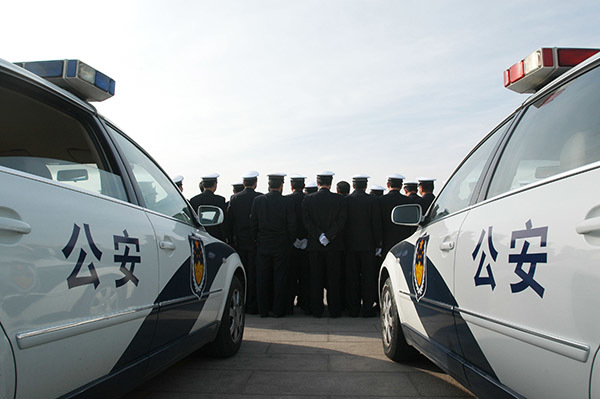Beginning to Betray Xi? Li Qiang’s Weakest Support for Xi at the Two Sessions (AI-Generated Image)
[People News] Chinese Premier Li Qiang is regarded as one of Xi Jinping's most trusted confidants. Recently, observers have noted that Li Qiang's influence has been growing, even to the extent of representing Xi Jinping at this year's BRICS summit. An article published on July 21 revealed that Li Qiang is the primary beneficiary of Xi Jinping's delegation of authority. The unusual job swap between Li Ganjie and Shi Taifeng in April has significantly bolstered Li Qiang's power.
An article by Chen Wenying highlights that Xi Jinping's three most trusted confidants are Cai Qi, the Secretary of the Central Secretariat, Premier Li Qiang, and Vice Premier Ding Xuexiang. The article notes that all three were exceptionally promoted to the highest leadership level of the Communist Party's Politburo Standing Committee in 2022. However, despite their close ties to Xi Jinping, they remain relatively distant from one another.
The article suggests that Cai Qi, as the chief of staff, appears to be the closest to Xi Jinping and holds considerable power. Nevertheless, it seems that Li Qiang is currently the biggest beneficiary of Xi Jinping's gradual delegation of authority.
Li Qiang has previously held positions as the Governor of Zhejiang Province, the Secretary of the Jiangsu Provincial Committee, and the Secretary of Shanghai. During Xi Jinping's tenure as the Secretary of the Zhejiang Provincial Committee from 2002 to 2007, Li Qiang, serving as the Provincial Secretary, began his rapid ascent as Xi Jinping's 'chief steward.'
Two months after Xi Jinping assumed leadership of the Communist Party of China in 2012, he appointed Li Qiang as the governor of Zhejiang Province. Three years later, Li Qiang was named Secretary of the Jiangsu Provincial Committee. In 2017, he took on the role of Secretary of the Shanghai Municipal Committee. Li Qiang made headlines by unexpectedly ranking second among the members of the Politburo Standing Committee during the 20th National Congress, after which he succeeded as Premier.
The article highlights Xi Jinping's evident trust in Li Qiang, as Li has regained some of the powers that were previously stripped from his predecessor, Li Keqiang, including certain decision-making authority over economic policies. This was particularly evident during Li Qiang's attendance at the BRICS summit in Rio de Janeiro, Brazil, from July 5 to 8, while Xi Jinping was absent from this meeting for the first time in 12 years.
This is not the first occasion on which Li Qiang has represented Xi Jinping at significant international meetings. Earlier in 2023, he made his debut at the G20 summit in place of Xi Jinping, which also generated considerable discussion.
Observers have noted that since news of Xi Jinping's serious illness surfaced following the Third Plenary Session of the Communist Party last July, Li Qiang's public appearances have become notably more prominent.
On November 5, 2024, the 7th China International Import Expo and Hongqiao International Economic Forum took place in Shanghai, where Li Qiang attended the opening ceremony and delivered a keynote speech. Notably, he did not mention Xi Jinping or his thoughts during his address, and Xi was absent from this expo, which he had personally planned, proposed, organised, and promoted in the previous five sessions.
Additionally, the General Administration of Customs of the Communist Party of China unexpectedly announced late on June 29 that it would immediately lift the import ban on Japanese seafood products. This ban had been in place since 2023 due to the discharge of nuclear wastewater from the Fukushima nuclear power plant into the ocean. Senior journalist and editorial writer Nakazawa Katsuji, who previously led Nikkei Asia's China bureau, analysed that this decision was likely driven by the State Council of the Communist Party of China, under the leadership of Li Qiang.
The article also noted that Li Qiang wields significant influence within the national bureaucratic system. He is currently the second most powerful figure in the Communist Party, after Xi Jinping, with the authority to convene officials at any time and lead study sessions on topics he designates.
Furthermore, the article revealed that Li Qiang's increasing power may also be a result of a peculiar personnel change that took place in April.
In early April, Shi Taifeng, the Minister of the United Front Work Department of the Central Committee, succeeded Li Ganjie as the Minister of the Organisation Department of the Central Committee, while Li Ganjie took over the United Front Work Department. This unusual swap of top leaders between two major functional departments of the Central Committee of the Communist Party of China is quite rare.
The article suggests that Shi Taifeng, as a former subordinate of Li Qiang, has gained control over the party's personnel arrangements. This authority will enable him to influence key personnel decisions for the next government at the 21st National Congress scheduled for 2027.
Public records indicate that Shi Taifeng served as the Deputy Secretary and Governor of the Jiangsu Provincial Party Committee from January 2016 to April 2017, while Li Qiang was the Secretary of the Jiangsu Provincial Party Committee from June 2016 to October 2017. The two collaborated closely for nearly a year.
Following this unusual job swap, rumours have surfaced regarding the delicate relationship between Li Qiang and Shi Taifeng. After both officials departed from Jiangsu, Li Qiang assumed the role of Party Secretary in Shanghai, while Shi Taifeng went on to serve as the Party Secretary of both the Ningxia Hui Autonomous Region and the Inner Mongolia Autonomous Region. Notably, on June 1, 2021, Li Qiang led a delegation from Shanghai to Inner Mongolia for an inspection, where he met with Shi Taifeng. Prior to this meeting, on April 19, Li Qiang and Gong Zheng had already met with the Inner Mongolia Party and government inspection team led by Shi Taifeng in Shanghai.
Analysts suggest that in less than two months, Li Qiang and Shi Taifeng met twice while serving in different regions. Whether these encounters were strictly for professional purposes or if there were other undisclosed motivations remains unclear, but it seems both officials may have factional ties. Thus, it is not entirely unfounded to assert that Shi Taifeng, who held significant organisational and personnel authority before the 21st National Congress, facilitated Li Qiang's rise to the position of General Secretary at that congress.
However, a commentary by Li Yanjie in The Epoch Times points out that Shi Taifeng is an alumnus of Peking University, like prominent faction leaders Li Keqiang and Hu Chunhua, and has had career interactions with high-ranking officials such as Hu Jintao, Zeng Qinghong, Xi Jinping, and Li Qiang. The politically intricate background of Shi Taifeng's appointment as Minister of the Organisation Department underscores the peculiarities of the CCP's political dynamics and introduces new variables and perspectives regarding the trends of internal power struggles at the upper echelons.
(People News first published) △










News magazine bootstrap themes!
I like this themes, fast loading and look profesional
Thank you Carlos!
You're welcome!
Please support me with give positive rating!
Yes Sure!